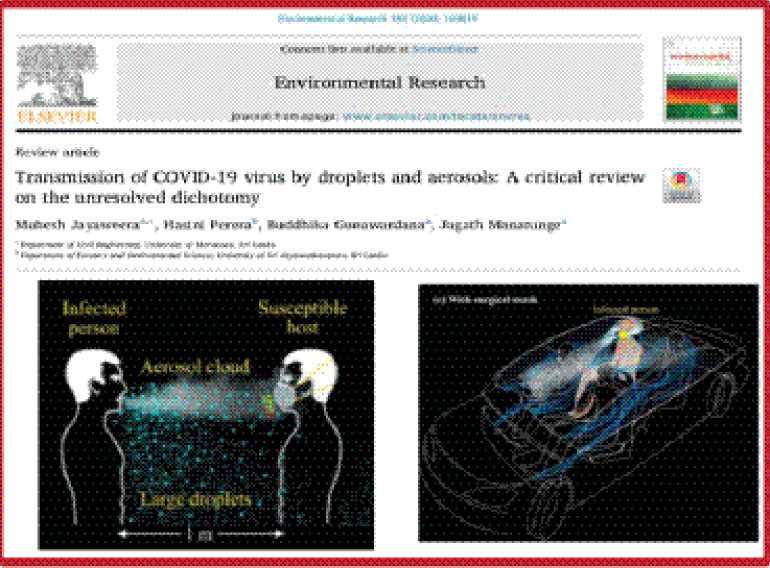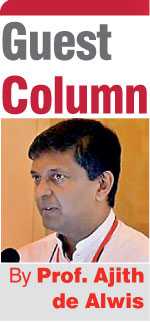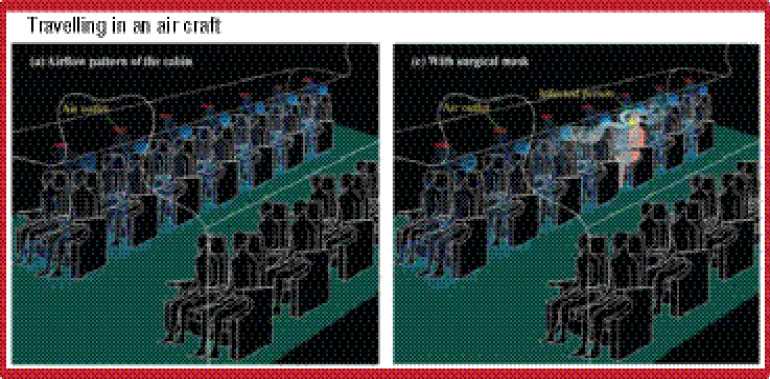Monday Feb 16, 2026
Monday Feb 16, 2026
Thursday, 16 July 2020 00:15 - - {{hitsCtrl.values.hits}}

What? Allowing COVID-19 to succeed? No, this is not about the virus – approx. 100nanometer diameter lifeless invisible organic material –succeeding, nor allowing it to show its power with RIPs planted on grounds across different landscapes. This is about not losing the opportunity to create success out of the situation. 
The economic situation we are in is bad. The situation cannot get any worse. The situation faced economically is a creation of years of inactivity, or all the wrong directions taken, such that when the crunch time comes, we are ill-prepared. However, while one cannot blame anyone really for the medical situation created, how one responds, and the subsequent developments from such responses, can be understood and commented on by anyone. Just turn on CNN; curve after curve decimating the performance of the Trump administration is quite interesting. Perhaps I am watching the wrong channel, instead of watching Fox News (which my cable service provider does not provide anyway), so I just cannot see the difference between news and fake news!
The response in trying times is the key to my heading. How we respond matters a lot in realising what the Chinese saw in creating the character to describe “crisis” – “danger” and “opportunity”. If you respond to the danger only, life for you and everyone else is a one of flight – into oblivion most likely. If fight was the response, the situation, however bad it may look, might turn out be the finest hour.
We can learn from Alibaba, and of course Jack Ma. Alibaba was a 1999 start-up based on the online B2B business model. Today, it is a giant e-commerce company worth $ 470+ billion. It was SARS that helped Alibaba to bloom: not because of the virus itself but due to the way Jack and his team took it on. When he sent his team home for a self-imposed isolation after one of his staff was stricken with SARS, they took their desktops – not laptops! – home, and with his core team holed up in his apartment, worked to change history. E-commerce was changed forever. He allowed people to post on his site free of charge for three years, and each transaction was not viewed with profits in mind. The capture of minds and growth was more important.
Alibaba was not the only one; JD.com is another example from China. One or two big indigenous growth engines can do wonders to the economy, and that we should not forget. Think what happened with us – sadly, it was breaking news of the wrong type. Our pioneer e-commerce player, even with successful demonstrations with drone deliveries, got it wrong. Still with all those lessons, I am not sure a bunch of rambutans in a box selling for Rs. 950 is the right way to grow. It is the business model and your target customers that appear to go wrong with Sri Lankan organisations and even with planners. We want to grow first and foremost by serving the outside. We have this mindset of believing and acting with no internal market.
We also appear to have the other strategy of marking up-and-up when the iron is hot! Jack Ma built his strategy with responsibility to his community in mind. SARS led to more self-imposed isolations, people latched onto online ordering, a new normal was created, and Alibaba soared. Getting rid of eBay in China was just an event on the timeline.
On Sri Lanka and Covid-19 from a medical perspective, we could be happy. I just wish that we did limit visitations to critical places. However, the situation should not be fought – and that exactly is what we are doing instead of resorting to flight! – with survival and same life at the end of the tunnel in mind! This is an opportunity to do many things and force changes that the usual circumstances would not allow at all.
If one is to place import controls, it should trigger a manufacturing revival. Otherwise foreign exchange saved is the only goal. We speak of having achieved a trade surplus for the first time in decades; that is not at all a real achievement. If one buys less and if the others pay us for what they buy from us, obviously surplus is a result. However, such surpluses are prone to vanish once the normal set of behaviours start to take hold. The window of opportunity available with COVID-19 should be utilised to ensure that what we see as chronic and acute weaknesses of the economy, which also means organisational behaviours and practices, are tuned to different frequencies.
It is a behavioural and neuroscience finding that if one practices something (actually a positive habit) over 66 days, then that sticks for life. This number of days used to be set at 21 days, but now had been usurped by better and more focused research. This number is interesting, as for Sri Lankans COVID-19 gave 66 days of curfew. The number of days when Colombo came out of the curfew was exactly 66 days. Now had we been practicing some good habits – more from less – under the imposed circumstances we would be supporting a key sustainability practice for life! One may say work from home is thus embedded for life. I know that some useless procedures that we were protecting with circulars evaporated overnight, without anyone dying in anguish. Some were University procedures. I am sure now we would definitely not be going back into those dark ages. We are looking forward to 25% of all lectures to happen online.
Looking around after 3 months of pandemic experience, the robots that moved in to medical settings appear to have been halted. The devices and systems that came in should have pointed towards a more efficient way of doing business, and local entrepreneurs should now be visible in supply chains. It did happen with swabs for virus testing. The Kotelawala Defense University has started producing ventilators on order, with a development lab available 24x7. That is the spirit of response, and the way to transform. As COVID-19 is of a scale way different from SARS, the opportunity space obviously is of a different scale as well. Pity the economy that only addresses the danger; there are many opportunities to move into a start-up economy.
There has to be more meaningful communication and decision-making through embracing science, technology and innovation. There is no developed economy in the world without a strong University in place. There is the onus for the researcher to rise up and be seen. The data points to significantly lower impact with COVID-19 in the tropical belt when there is sun all year round. There is also the complex evidence of BCG vaccination supporting disease avoidance and response. There is also the discussion on tea, and its power of antioxidants proving beneficial. So many rich opportunities for research within as cohorts are ever present. Now research should drive national response.
Still we are fighting the disease with old techniques – contact-tracing, isolation and masks. While I agree that one need not discard trusted solutions yet at this stage, there is the other challenge – livelihoods and economy, and that is the reason for innovations. The more recent research on immunity being short-lived is sure to add another challenge. Again, a reason to better understand our immunity conditions developed through diet and lifestyle etc. Research results of Prof Neelika’s group at USJPura are awaited, as they have done so much, from detecting the first COVID-19 patient up to genomics on the virus. Research from UoM Prof Jayaweera’s group has been published on coughing and sneezing, an excellent review for planning out working with donning masks and safe distancing. At UoC, Dr. Sameera has published on a possible drug candidate through computer modelling. The issue is these stay as isolated works, as they are not part of the whole, and thus have no impact locally. Our media is not describing such information with depth, driving up the required literacy. Still, there is more space and prime time for astrology, even after its well-demonstrated ineptness to predict on what really matter. We will just follow an external directive without having the courage to discuss, plan and act differently. Embedding PDCA with innovation is sure to be useful. Remember the famous line of Shiv Kera – Winners do not do different things, they do things differently!
As an island, now with tourism closed and about 12000 monthly departures for jobs abroad stalled, one should imagine a new economic order to be introduced – a circular economy to be precise. In a circular economy, we would be mimicking nature, and that is not quite bad as nature has millions of years in history, and what it is doing now is probably the most sustainable. On the other hand, we are bludgeoning nature into submission, and in that process a small piece of biological material wrongly transferred has brought us down to our knees! Nature works in ways that one always can say are mutually beneficial. We work to win, so a loser is a must – one yearns for a profit so someone should make a loss, and working relationships are built on power principles.
COVID-19 is still present. Wishing it to go away is not materialising. Redefining the way forward with a strong purpose by building a resilient economy has to be achieved, rather than continuously cursing the curse! It is time to see the virus and the current situation differently.
